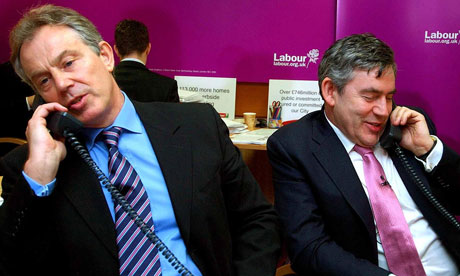Tony Blair: I knew Gordon Brown would be a disaster
World exclusive: As he publishes memoir, ex-PM urges party not to shift to the left
• 'I've got something to say' – exclusive Tony Blair interview
• Blair on Brown: 'Emotional intelligence: zero'
• I didn't see Iraq nightmare coming, says Blair
• 'I've got something to say' – exclusive Tony Blair interview
• Blair on Brown: 'Emotional intelligence: zero'
• I didn't see Iraq nightmare coming, says Blair

- A Journey
- by Tony Blair
-

- Buy it from the Guardian bookshop
Blair's memoir contains a passionate defence of the war in Iraq and of New Labour's public service and welfare reform plans, which the former prime minister believes his successor abandoned.
Although he refuses directly to endorse any candidate for the Labour leadership, he also makes a number of comments which are likely to be interpreted as criticism of Ed Miliband, vying with his brother David in a contest which reaches a climax as party members receive their ballot papers on Wednesday.
In the book and in his only pre-publication interview, Blair reveals that:
• Brown personally threatened to bring him down over the loans for honours scandal in 2006, before offering to stay his hand in return for the abandonment of Lord Turner's plans to reform pensions.
• He feels intense "anguish" over the lives lost in the Iraq war and failed to "guess the nightmare that unfolded".
• He believes Labour was wrong to ban fox hunting and pass the freedom of information act which is "not practical" for good government.
Blair nails his policy colours to the mast in his memoir by launching a sustained attack on the belief that the financial crisis means that voters want the return of the state as a major economic player. In remarks that will be seen as an implied attack on Ed Miliband and Ed Balls, Blair says voters will not elect a party which fails to offer a credible attack on the deficit.
In the interview, the former prime minister says "I adore the Labour party" – but warns Labour that if its attack on the Conservative-Lib Dem coalition "defaults to a 'Tory cutters and Lib Dem collaborators' mantra", then it will win some short-term popularity, but not be elected to government.
Speaking to the Guardian before he left for White House talks on the Middle East peace process, Blair said that his 700-page memoir showed New Labour would in time come to be seen as a "great reforming government" in which Brown played a very significant positive part. But his book reveals numerous occasions on which the struggle between the two New Labour titans sapped the strength and direction of the government, leading Blair to delay his handover to his chancellor.
"It is easy to say now, in the light of his tenture as prime minister, that I should have stopped it," Blair writes. But he would have been wrong to have sacked Brown as chancellor or to have campaigned against him becoming Labour leader. "At his best, his intellect and energy were vast and beneficial to the country," Blair writes.
However, Blair confirms in his interview with the Guardian that he believed Brown would be a "disaster" as prime minister unless he committed himself to the New Labour path laid out by his predecessor. "Labour won when it was New Labour," Blair writes in his memoir. "It lost because it stopped being New Labour."
The fresh focus on the long-running battle between Blair and Brown, which dates back to just after the 1992 election, Blair's account confirms, is likely to dismay many in the Labour party as the contest for the leadership gets underway. Yet Blair insists in his book and his Guardian interview that the argument is not about personalities but about policies.
On Iraq, Blair offers no change of heart but gives his most detailed defence yet of the policy of overthrowing Saddam Hussein in 2003. He writes emotionally of his anguish at not having anticipated "the nightmare that unfolded" after the initial success of toppling Saddam, and says he is devoting "a large part of the life left to me" to Middle East peace and interfaith reconciliation with the Muslim world.
He mounts a strong defence of the continuing war in Afghanistan and says that he would "not take a risk" of allowing Iran to acquire nuclear capability. However in his book Blair reveals that he "hesitated" before backing the renewal of Britain's Trident nuclear weapons in 2006.
Blair's outspoken remarks about the financial crisis and the aftermath of the British general election of 2010 in his book's postscript are likely to have a wide party political impact, especially his caution about any embrace of the view that "the state is back".
"The problem, I would say error, was in buying a package which combined deficit spending, heavy regulation, identifying banks as the malfeasants and jettisoning the reinvention of government in favour of the rehabilitation of government. The public understands the difference between the state being forced to intervene to stabilise the market and government back in fashion as a major actor in the economy."
Britain got what it wanted in May 2010, Blair claims – "a Tory version of a centrist government". A Labour-Lib Dem coalition was "never on" he argues. "2010 was one we were never going to win." Labour faces a danger of a drift to the left, Blair warns. If that is allowed to happen, it will lose even more conclusively in 2015.
Source
「讓白高敦執政是災難」
廿載瑜亮之爭 戰友為相位反目
貝理雅與白高敦曾是並肩打江山的親密戰友,逐漸明爭暗鬥反目成仇,白高敦甚至不惜4年前幕後策動逼宮,把貝理雅拉下馬,全因兩人逾廿載的「瑜亮之爭」。貝 理雅和白高敦恩怨始於1983年,他們同時進入下議院成為議員,甚至曾共用辦公室。1994年,工黨黨魁史密斯(John Smith)逝世,兩人為爭奪黨魁而起心病。由於兩人在黨內實力旗鼓相當,為保黨內團結,兩人據報曾私下協議,白高敦答應讓路,由貝理雅先當黨魁,他日拜 相後,要讓白高敦出任財相,並在第二任期把首相寶座讓給白高敦。
政治魅力十足的貝理雅,1997年領導工黨上台,但工黨當權後搞實務更多 的,其實是白高敦。在他主理經濟下,英國經歷了50年來最長經濟增長期,連美國聯儲局前主席格林斯潘(Alan Greenspan)都盛讚白高敦超卓的經濟決策能力,他所締造的經濟成績,鞏固了貝理雅的民望,惟兩人關係日差。
貝理雅被指違諾拒讓位
白高敦2003年就為出兵伊拉克開支,與貝理雅唱反調,貝理雅則不理君子協議,拒絕交出相位,兩人終反目成仇。Source
No comments:
Post a Comment